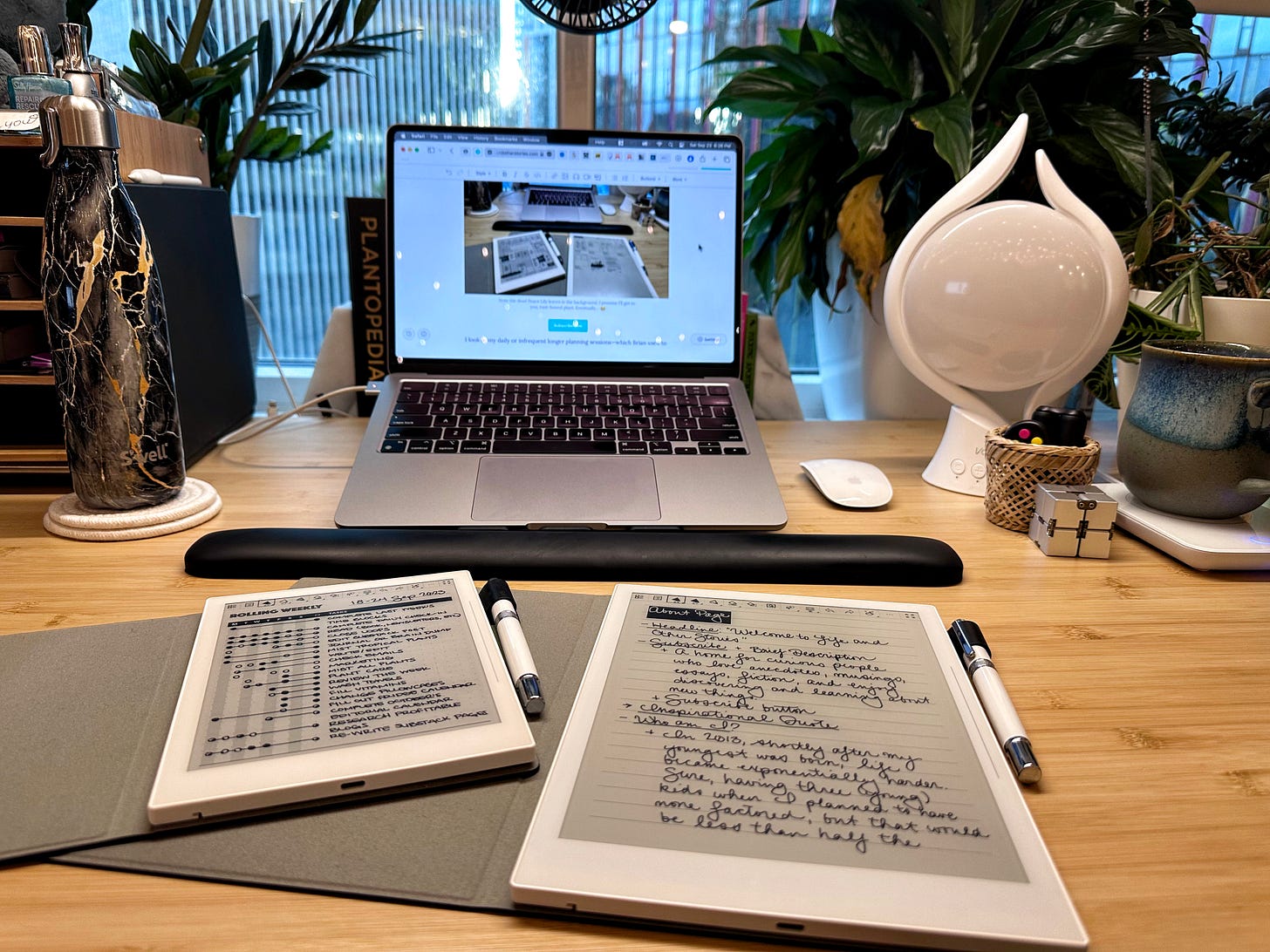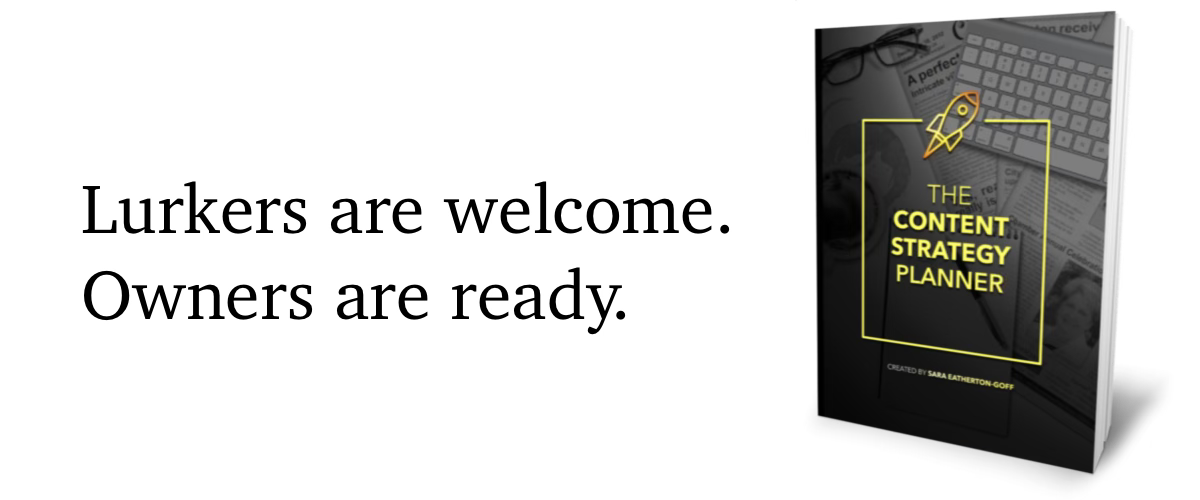Not tripping for fall
A productivity tip, a borrowed exercise, an update, on failure, and more.
This newsletter has moved!
To receive new and infrequent musings, the latest fiction and non-fiction narratives, updates, and "life nuggets”, subscribe here.
“Reframe failure as data, and everything changes.”—Marta Rose
Most all of the plans for summer were a wash, and it didn’t matter—I didn’t mind.
I felt bad because my kids were a bit disappointed with their use of summer-time. And our month-long house guest’s expectations for their time here apparently weren’t met either. (I bit off more than I could chew, certainly.)
But I enjoyed the summer, overall.
I spent most of it tinkering. I got rest. I started reading books again. I journaled. I got a new psychiatric nurse practitioner after mine retired early last year (and I just quit the meds… whoops).
I learned so much about myself, and now am a far less “masked” Autistic person in just three months of some actual self-focus and exploration. And I’m confident that taking the time to deep-read Unmasking Autism* helped my general sense of well-being, too.
I learned about “closing loops”—to finish or complete something in a way that leaves no outstanding issues or unanswered questions1—from a Mom-geared, minimalism-focused podcast episode (Apple podcast only, it seems) that transformed my life (no exaggeration!) in just the last month of summer. It’s amazing how much more your brain can do and tolerate when you don’t have niggling thoughts interrupting you constantly: Crap! I forgot to call the school about X! and Crap! I forgot to schedule the kids’ annual wellness exams… three months late…. Etc.
Those tasks are done. Check.
I also learned that I actually am the person someone new meets in-the-flesh.
I’m not the phony I thought I was. I’ve mostly always been me, only trying way too hard to be liked and accepted by the majority of people. (It’s a longer story I could delve into later.)
I needed this time. I needed it.
Prior, most days felt like I was just spinning my wheels. It felt like I had no purpose, no focus.
And, while reading my now dusted off copy of Unmasking Autism, I’m slowly learning to overcome that people-pleasing, deeply ingrained, artificial facet of my self-created public persona. I acted like my life depended on it—which I won’t discount for other Autists, but it’s not 100% necessary for me. Masking amplifies my anxiety, and robs me of valuable time thinking and worrying about things that don’t matter.
In Unmasking Autism, author Dr. Devon Price wrote, “But when we look at time as a series of cycles or spirals with goals that are ever-shifting, we can recognize that learning and reflection we put into an aborted project (or even into masking) often pays off, just not in the way we expected. Every disappointment or failure teaches us something about what we want, and what is best for us.”
I’ve found this to be true.
Although I created the mask to protect myself from scrutiny and rejection from my peers, it served its purpose. I can blend in. I can attract good people I actually enjoy being around. But I can also still fiddle with a fidget toy when I read, unconsciously sway back and forth in a long line to self-soothe, and laugh and talk too loud and “too much” because that’s just who and how I am. If someone has a problem with it, they can speak up. It’s not my job to try to make everyone else comfortable when they’re around me. No one’s paying me to do so, yet I’ve certainly put other people’s comfort above my own my entire conscious life as if it were a paid gig.
Every time I open Unmasking Autism for an absorption-paced, 30-minute reading session, it changes my life in even the most subtle of ways. (Side note: It’s a book I recommend to all people—not just Autists.)
Although under-utilized, I’m trying to view the time taken to plan things out as gifts to myself.
In-the-moment planning offers me a sense of control in an out-of-control existence.
I can map out what I want to do, what I need to do, and how I should or can do it—little suggestions to my future self. It satisfies the more ordered, Autistic side of me.
However, the ADHD side often sees said plan later—and whatever wasn’t a previously created habitual task—and it tuts at and casts off the day’s non-habitual task list. So, over the summer, I practiced building new habits to counter the more defiant, distractible part of me.
Should I have written more? Maybe. But now I’m stronger and sturdier, and in a more stable place to write from.
Now, each day I read for at least 30 minutes. A small feat, but going from reading two to three books a month to being unable to finish a single book since my first COVID infection in May 2022, this is a major achievement for me.
I now include time every weekday plus some time on Sundays to Close Loops, too.
About three and a half weeks before the school year began, I sat myself down and made several lists of:
Family Tasks
Personal Tasks
Professional Tasks
Household Tasks
[Pre-Moving Tasks]
[Substack] Project Tasks
…and so on, and filled up the pages of my little Supernote e-ink writing tablet.
Each day I look at what remains of these evergreen lists, and I decide: What’s one important task I can knock out in 30 minutes or less?
Mind you, these are all tasks I’d put off for weeks, months, and maybe even a year or longer. Tasks that I shamed myself over every time they popped into my head and I told myself I really need to do that, but still didn’t get around to it.
Now, I do. Every day it’s needed.
One of my kids who shows the most signs of Ehlers-Danlos Syndrome2—a connective tissue disorder—and whose life is negatively affected by it now has an orthopedic assessment scheduled next month. I finally found a new (in-network) children’s dentist and got the kids in before their twice-annual dental cleaning appointments were due.
One of my kids who struggles with verbal communication and processing wanted to see a therapist. We’ve tried in the past, but never found the right fit. However, after discovering alternative therapies like Art Therapy,3 and a local-ish center that works almost exclusively with neurodivergent youth, she’s now starting therapy with an actually Autism-friendly LMFT in early October.
The list of completed appointments scheduled and kept already, and other accomplishments goes on and on.
I feel great about myself. I feel whole and productive, useful, needed, and helpful.
This summer’s occurrences weren’t “planned,” but they became realities when I gave myself the space to just be.
It’s a space of privilege, I understand. One I’m grateful for, but one that’s also left me with a wake of other surfaced struggles to contend with. Like, lesser funds, for one, and very little in-person social time.
I left all the groups I was in due to social overwhelm, but added “socialize more” to my list of personal tasks. So, recently I signed up for some Meetups to get my ass out into the world again, socializing with other activity-enjoying or neurodivergent adults in real life.
With all that, the prospect of coming back to these posts offered plenty of confusion and indecision.
Writing is a great love of mine, but I questioned everything over the summer.
Talking to a designer acquaintance and a fellow writer friend, I confessed separately that I’m not sure if I want to continue writing—particularly writing these posts. At the time, I didn’t realize that it wasn’t because I don’t love writing to you, it’s because I forgot why I wanted to do this in the first place.
While completing the first exercise in Unmasking Autism, the author utilized a Values-Based Integration exercise4 from fellow Autistic writer, Heather R. Morgan. In it, they ask us to think of five moments in life when you felt fully alive, and to think specifically about why the moment(s) stuck with you.
One moment was with my mom; one was with Brian; one was actually a huge moment of revelation about my last day as a Mary Kay consultant; the last one was when I discovered myself and our family were all Autistic, with the later validation and official confirmation by diagnosticians; but the fourth was when I was severely ill and immobilized by undiagnosed Celiac Disease.5 That’s when my obsession with bullet journaling6 started, soon spilling over into (Morning Pages)7 journaling, then into, I should document this health journey to help other people who may be experiencing similar struggles.
Writing and sharing gave and gives me purpose beyond what so many people have told me simply being a mother offers them, but “wasn’t enough” for me.
I feel valuable. And my writing proves that I can communicate and do communicate well with practice and diligence. (Except for maybe my excessive use of “I”s….)
Although I feel the most when I sing, and express myself most in an outwardly creative way through the visual arts, the written word is my most accessible tool of self-expression. Original words and original thoughts, shared my way.
I’m not the best at it, but it breathes life into me. It taps into what felt like previously unrealized compassion and a general understanding of life that I felt unable to obtain prior.
Writing helps me connect, share, and grow.
Writing fulfills me.
So, here I am. Back! Finally.
I’m grateful for you and for your patience. I hope you had a great summer! Thanks for being here.
All my best,
Sara
subscribe to | my free, sporadic newsletter
get the | Content Strategy Planner
support my work and | “buy me a coffee”
visit the website | segwrites.com
P.S. I predominantly write from my personal experience as an Autistic person with ADHD, chronic illness, Anxiety, and more. Each of these factors can influence my individual experience overall, as well as my experience of each condition.
What I share is not a substitute for medical advice.
Self-identification of Autism (what many call “self-diagnosis”) is perfectly valid. If a personal Autistic experience I write about resonates deeply with you, consider these resources on Embrace Autism (starting with the Autism Quotient Test) as a first step. If professional assessment is important to you or your life has been impeded enough that you may need to qualify for Disability, you can print your results to bring to a diagnostician. (Having all those tests completed in advance saved me a lot of money!) Although there are many more diagnosticians available, here is a comprehensive list to get you started.
Lastly, some of my opinions may have changed since I first wrote the piece that lead you here.
Comment with any questions, and I’ll respond as soon as I can.
*Any product listed with an asterisk(*) behind it is an affiliate link. By using that link to purchase an item, you provide a small commission at no extra cost to you. Although small, these little income boosts help to keep Life and Other Stories going, as well as help me fund any in-the-works projects. Thank you for your contribution! I’m grateful.
“Close [the] loop,” definition via USdictionary
What is Ehlers-Danlos Syndrome (EDS)?, The Ehlers Danlos Society
[Definition of] art therapy, wellness[dot]com
What is Celiac Disease?, Celiac Disease Foundation
What is the Bullet Journal Method?, bulletjournal[dot]com
[What are] Morning Pages, Julia Cameron Live




